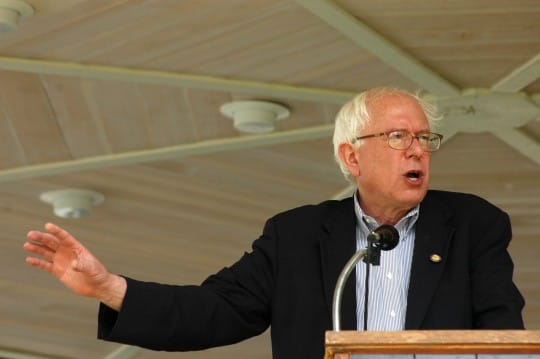Wealth Inequality and the Anti-Oligarchy Amendment

Sen. Bernie Sanders of Vermont Credit: madmikesamerica.com

Economic inequality has been steadily growing in the United States over the last three decades. Since 1980, the real after-tax income of the top 1% of earners has increased by 277%, while that of the bottom 20% of earners has increased by just 18%, and that of the middle 60% by 38%, according to the Congressional Budget Office. Among developed countries worldwide, the United States has one of the largest gaps between rich and poor. The CIA World Factbook ranks the US 42nd out of 136 in its list of countries compared by their respective distribution of family income. On the CIA's scale, the higher a country's ranking, the higher the level of income inequality.
This basic fact has far-reaching consequences for our nation's politics. Senator Bernie Sanders of Vermont, one of only two Independents in the Congress, argues that this development represents a danger to over 150 years worth of progress in the direction of more democratic government. Earlier this week, in testimony before the Senate Committee on the Judiciary Subcommittee on the Constitution, Civil Rights and Human Rights, Sen. Sanders stated that rising wealth inequality portends oligarchy.
“Tragically, and I say this advisedly, we are well on our way to seeing our great country move toward an oligarchic form of government -- where virtually all economic and political power rest with a handful of very wealthy families. This is a trend we must reverse,” said Sanders.
In a separate report, provocatively titled “America For Sale: A Report on Billionaires Buying the 2012 Election,” Sanders identifies 23 billionaire families that have each already donated more than $250,000 to various Super PACs for the current election cycle, totaling over $61 million in donations.
“In other words, not content to own our economy, the one percent want to own our government as well,” remarked Senator Sanders in his testimony.
The rise of the Super PAC was, of course, enabled by the Supreme Court's decision in Citizens United. Sanders thus concluded his testimony with a call for a constitutional amendment that would override that decision. The proposed amendment states that for-profit corporations are not people and are not guaranteed constitutional rights reserved to persons, that such corporations are subject to regulation by the states, and that they may not contribute to political campaigns. The amendment would further stipulate that the Congress and the states have the right to regulate political contributions.
According to Sanders, six states and over 200 local governments have already passed resolutions calling for a constitutional amendment to overturn the Citizens United decision. The amendment was introduced into the House by Congressman Ted Deutsch, a Democrat from Florida.
Such an amendment could drastically change the culture of corruption that has been developed by the Democratic and Republican party machines. Sanders and the supporters of this amendment have their work cut out for them as they seek to cut out the heart of the system of legal bribery that drives the major parties. Just ask convicted lobbyist Jack Abramoff. In a recent article for The Atlantic, he writes:
“During the years I was lobbying, I purveyed millions of my own and clients' dollars to congressmen . . . I never contemplated that these payments were really just bribes, but they were. Like most dissembling Washington hacks, I viewed these payments as legitimate political contributions.”



